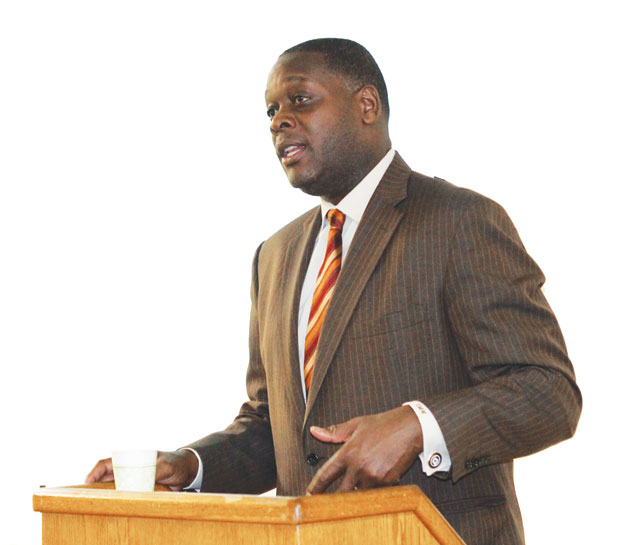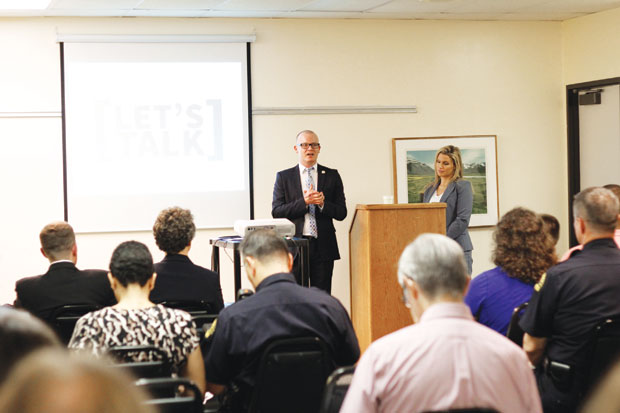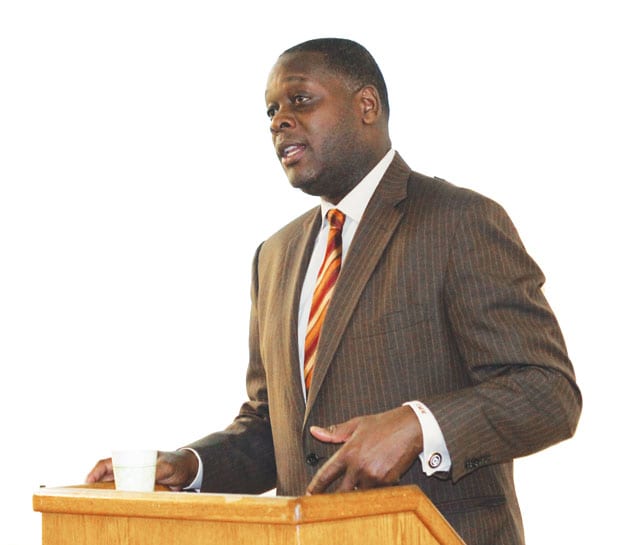Watkins’ team holds meeting at Resource Center to introduce itself to the community

LAW & ORDER | Dallas County District Attorney Craig Watkins decided to form his LGBT Task Force when he realized that many LGBT people are afraid to report crimes against them.
Mathew Shaw | Special Contributor
Members of Dallas County District Attorney Craig Watkins’ newly-formed LGBT Task Force told those attending a June 30 town hall meeting at Resource Center that the justice system is there to protect them.
Watkins got the idea to create the task force after learning that the city’s LGBT residents are often afraid to report crimes committed against them, said task force member James Tate. Watkins said creating the task force “really gives us an opportunity to address issues.”
He added, “We are there to protect you just like we are there to protect all citizens of Dallas County.”
Task force members attending the meeting included Community Relations Manager James Tate; Assistant District Attorneys Ellyce Lindberg, Justin Lord and Craig McNeil; Investigator Tonia Silva and Senior Clinician and Caseworker Renee Breazeale. Members who were not present were Victim Services Advocate Raquel Mayhorn and Investigator Edith Santos.
According to the website for Watkins’ office, this task force is the first of its kind for the Dallas County DA’s Office, and it was “created to specifically address concerns within the lesbian, gay, bisexual and transgender community.”
The website says the task force’s mission is to “fortify a continued relationship with the LGBT community and Dallas County communities at-large.” It includes prosecutors, an investigator, a senior case worker, a victim advocate and a spokesperson who “work jointly to increase communication and awareness between the District Attorney’s office and the LGBT community,” according to the website. “The Task Force will advise on issues that affect LGBT interests and safety, and will serve as an advisor to address needs within victim services.”

JUSTICE FOR ALL | Community Relations Manager James Tate, left, and Assistant District Attorney Ellyce Lindberg were among the members of the Dallas County District Attorney’s Office LGBT Task Force that attended a town hall meeting June 30 at Resource Center. (Tammye Nash/Dallas Voice)
Lindberg talked about the process of trying cases, explaining that the DA’s Office doesn’t prosecute cases just in Dallas. She noted that 26 cities and 42 agencies — such as Parkland Hospital — generate cases that feed into Dallas County.
“All of those different cities, when any kind of crime happens, from a Class B misdemeanor or above, come down to Dallas County,” Lindberg said.
Every felony case has to go before a 12-person grand jury to get an indictment. Then prosecutors have to prove “beyond a reasonable doubt” that the accused is definitely the one who committed the crime.
“That’s the highest standard in the law that exists,” Lindberg said. “We struggle with that on a daily basis.”
That same burden of proof, Lord noted, applies to getting convictions in hate crime cases, too. He said that the hate crimes law is “basically a punishment enhancement statute,” and that prosecutors have to prove to the jury that the defendant committed the crime out of “bias or prejudice against a group identified by race, color, disability, religion, national origin or ancestry, age, gender or sexual preference.”
Lord cited the recent graffiti incidences in Oak Lawn as an example. Normally, defacing a public monument with graffiti is a state jail felony punishable by up to 180 days to two years in jail. If the graffiti is motivated by hate, however, the crime becomes a third degree felony punishable by up to 10 years in prison.
“We want everybody in the community to know that we’re all about fighting for justice, and we’re on the side of the victim,” Lord said. “And anybody who is the victim of a crime … should feel absolutely free to come to us and expect us to prosecute, and we will. And we can’t do it without cooperation.”
Activist Oliver Blumer, a Dallas County resident, attended the June 30 meeting and commended Watkins for creating the task force. But Blumer criticized use of the singular term “community.”
“They’re all trying to be politically correct, but it’s really a default term for them because they don’t really know where to start,” he said. “It’s not just ‘community.’ It’s ‘communities.’ This is just the start to working towards intersectionality.”
The task force can be contacted at lgbt@dallasda.com, and the DA’s office can be found at facebook.com/dallasda, at @dallasda on Twitter and on Instagram.
This article appeared in the Dallas Voice print edition July 4, 2014.


